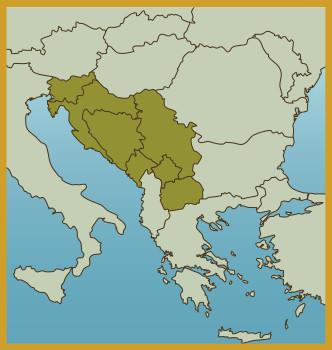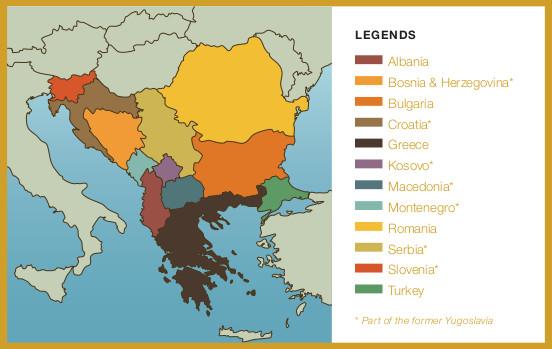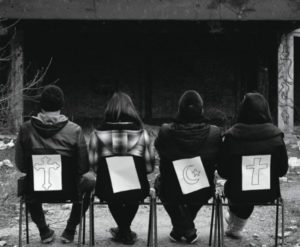“A Christian lives not in himself, but in Christ and in his neighbor. Otherwise he is not a Christian. He lives in Christ through faith, in his neighbor through love. By faith he is caught up beyond himself into God. By love he descends beneath himself into his neighbor. Yet he always remains in God and in his love.”1
Recently, a young Bosnian evangelical friend described his experience at an ecumenical prayer gathering he attended on behalf of the Baptist Church in Croatia. “The atmosphere felt cold,” he said to me, “as if there were no real relationships or friendships amongst the religious leaders.” Although certainly there are real relationships across various religious and ethnic lines in this region, my friend still touched upon an important point—ecumenism and interfaith engagement, particularly in a place where the memory of a brutal conflict still plays a role in politics and society, soon hollows into an empty shell of pretense if they never evolve into real relationships.

My last three years in Southeastern Europe have traced a steep learning curve in regard to the complex cultural, ethnic, historical, religious, and political factors contributing to the present mosaic. This has helped me begin to understand how Christians here see themselves and their role in society. The challenge of interfaith engagement in this part of the world is not a clear-cut step across a religious boundary. In fact “Othering”—that is, the reduction of a person or community into a stereotype and generalized assumptions—can take a few different forms. Most fundamentally, ethnic, national, and religious identities are often tightly interwoven, and this fused identity has at times been used to further one’s national interest. In other words, generally in this region, to be Croat is to be Catholic; to be Serbian, Macedonian, or Montenegrin is to be Orthodox; and to be a Bosniak or a Kosovar Albanian (although a small percentage of Kosovars are Catholic) is to be Muslim. Sometimes this ethno-religious identification can be devoid of religious meaning—for example, it is not so strange to meet a Croatian who self-identifies as a Catholic and yet is agnostic or even atheist. Second, Othering takes place across purely ethnic lines. For instance, there is a sizeable Romani population scattered in countries throughout Southeastern Europe; although they often adopt the primary religion of the country in which they reside, they are generally marginalized by virtue of being Romani and kept out of most conversations. Finally, there is an Othering across Christian traditions—most notably between the historic traditions (Catholic and Orthodox) and the Protestant and evangelical communities, which are in the vast minority.
These different forms of Othering, which have been shaped through history and further demarcated by the regional wars in the 1990s, speak to the fact that identity—both of oneself and of the Other—present a complicated challenge to interfaith engagement. In fact, identity and one’s self-understanding in relation to the Other is directly related to the quality of engagement between the two. If two individuals have a genuine relationship, it is possible that not only do the caricatures of ascribed identity dissolve but also that one’s self-identity will incorporate the Other. In this process the Other can be transformed into a friend and neighbor. Most importantly, the quality of engagement directly affects the peace and common good in these societies.
What role can dialogue play in reshaping identity with regard to the Other—whether it be crossing religious, ethno-religious, or ethnic lines? Instead of being permanently locked in war memories, injustices, or historically ascribed identities as one’s only association with the Other, a dialogical encounter can form new relational memories that can birth fresh possibilities for communal flourishing. In fact, the apparent incompatibility of historical memories across ethno-religious lines—which is an acute obstacle preventing forgiveness and reconciliation—can actually serve to illuminate one’s own prejudices through the dialogue process. Mohammed Abu-Nimer argues in Interfaith Dialogue and Peacemaking that a dialogical encounter can transform perceptions of the conflict and of the enemy after an acknowledgement of the mutuality of their fears: “When that bridge is constructed between the two sides, a powerful connection has been made—one that separates dialoguers from non-dialoguers.” Interfaith dialogue, Abu-Nimer points out, in comparison to a secular or interethnic encounter, can have a deeply transformative effect because it gives spirituality a central role in the process. The dialogical encounter processed through one’s spiritual identity—that is, one’s deeply held values and beliefs—leads to a “deeper human connection” and becomes the “source” for joint action geared towards community flourishing.2
If spirituality and religious commitment are central in reshaping identity in the dialogical transformative process, what should be the Christian’s response? Miroslav Volf emphasizes in his book The End of Memory that Christian identity is unique—in fact, this identity becomes one of displacement, pointing to Martin Luther’s depiction of identity as being hidden in God through faith and in our neighbor through love. Therefore, Volf claims, “we are not fundamentally the sum of our past experiences… they qualify rather than define who we are.”3
 In this region of the world, Protestants and evangelicals provide a witness of identity displaced from ethnic or nationalistic ties, since they are not associated with a national church. In addition, examples from the Catholic Church illustrate what it means to step out of ethno-religious identity in order to partner with evangelicals on projects that will serve to better society. Unfortunately, all too often, mutual prejudices exist across the boundaries of the Protestant, evangelical, Orthodox, and Catholic traditions. Evangelicals frequently have a hard time believing that one can be a true follower of Christ and remain in the Catholic or Orthodox confessions, particularly if they encountered personal opposition when they stepped away from their traditional roots. To Catholics and Orthodox, Protestants and evangelicals are often seen as sectarian or even worse as traitors to one’s nation. And yet, the witness of Christian unity is a vital component to peacekeeping and reconciliation in this context. Despite—and perhaps because of—the ongoing challenges in this region, Christians in Southeastern Europe have unique theological perspectives to offer the rest of the global church.
In this region of the world, Protestants and evangelicals provide a witness of identity displaced from ethnic or nationalistic ties, since they are not associated with a national church. In addition, examples from the Catholic Church illustrate what it means to step out of ethno-religious identity in order to partner with evangelicals on projects that will serve to better society. Unfortunately, all too often, mutual prejudices exist across the boundaries of the Protestant, evangelical, Orthodox, and Catholic traditions. Evangelicals frequently have a hard time believing that one can be a true follower of Christ and remain in the Catholic or Orthodox confessions, particularly if they encountered personal opposition when they stepped away from their traditional roots. To Catholics and Orthodox, Protestants and evangelicals are often seen as sectarian or even worse as traitors to one’s nation. And yet, the witness of Christian unity is a vital component to peacekeeping and reconciliation in this context. Despite—and perhaps because of—the ongoing challenges in this region, Christians in Southeastern Europe have unique theological perspectives to offer the rest of the global church.
This issue of Evangelical Interfaith Dialogue journal includes essays from Christians from various religious traditions and diverse countries of the former Yugoslavia. There is a recognizable coherence in the themes of these collected essays: the necessity of spirituality to the dialogue and reconciliation process, the complexity of identities and how they can both restrict and transform interfaith engagement, and the possibilities for evangelicals to contribute to human flourishing in Southeastern Europe. As such, this issue is not an attempt to revisit the reasons for the wars or to provide a comprehensive analysis of the current situation—there are many perspectives that could have been included to further deepen and broaden the picture. Instead, it offers to the global evangelical church voices from those who are attempting to live out their faith in these Southeastern European countries. We are privileged to hear evangelical, Catholic, and Orthodox perspectives from Croatia, Bosnia and Herzegovina, Serbia, and Macedonia that speak directly from their local contexts.
 I suggest you begin with Dr. Kostake Milkov’s essay in which he briefly traces the history of the region in order to explain the complexity of the forces that have shaped religious, ethnic, and national identity over the last 20 years. He then proceeds to narrow his focus and discusses the specific challenges of the Evangelical Church in Macedonia. Following his essay, I encourage you to read through the other essays as determined by your interest. The following is a brief description of the contents of each essay.
I suggest you begin with Dr. Kostake Milkov’s essay in which he briefly traces the history of the region in order to explain the complexity of the forces that have shaped religious, ethnic, and national identity over the last 20 years. He then proceeds to narrow his focus and discusses the specific challenges of the Evangelical Church in Macedonia. Following his essay, I encourage you to read through the other essays as determined by your interest. The following is a brief description of the contents of each essay.
Dr. Branko Bjelajac writes about the ongoing difficulties of identity in Serbia—even 19 years after the war. Evangelical communities, he argues, are the only neutral mixing ground and have the potential to witness across all sectors of society. However, discrimination against evangelicals in Serbia abounds, and therefore there is very little interfaith and interreligious cooperation.
Ela Magda discusses how “secondhand” memories have influenced the next generation of youth in Croatia. Because they have been formed by their parents’ experiences in the war, the youths’ sense of tradition and identity remains unchanged or unchallenged. She calls for a “forced” identity crisis through dialogue in order for them to reevaluate their identity.
The praxis piece depicts an ongoing conflict in Vukovar, Croatia—a city largely destroyed in the war—painting a tangible picture of how these forces of first- and secondhand memories play out in current social and political events. Dr. Ljiljana Gehrecke, an Orthodox Christian of German descent, has had a visionary leadership role in the peacebuilding and reconciliation process in Vukovar over the last decade and offers her insights regarding the connection between spirituality and peacemaking.
Julijana Mladenovska-Tešija uses the recent event surrounding gay marriage in Croatia as a lens by which to analyze some of the issues that evangelicals face when they are engaging with their neighbors who may differ from them regarding ethnicity, religion, values, and political beliefs. She argues that making dialogue a normal part of everyday life, both within the church and between the church and society, is critical both for maintaining an open society and for our Christian witness.
Marko Oršolić, a Franciscan, theologian, and political scientist, has played a critical role in peacemaking and dialogue in Bosnian society over the past couple of decades. He offers insights into the complexity and difficulty of interfaith relations in Bosnia and Herzegovina and talks about the unique role played by the International Multi-religious and Intercultural Center (IMIC) in Sarajevo for fostering peace.
Authentic followers of Christ in all Christian traditions have a unique role to play in cultivating peace and interfaith engagement; courageously vulnerable dialogue is critical and must begin first in the Christian community as a model and witness to the rest of society. And, as my young Bosnian friend noted, the dialogical encounter that fails to progress into any kind of relationship will remain strictly superficial—identities that remain static lack the communal power to effect lasting change. When the Other becomes a neighbor, however, individual and communal identities become a dynamic narrative influencing the texture of society.
ENDNOTES
1Martin Luther, The Freedom of a Christian, in Luther’s Works, 31:371; as quoted in Miroslav Volf, The End of Memory: Remembering Rightly in a Violent World (Grand Rapids: Eerdmans, 2006), 198.
2Mohammed Abu-Nimer, “The Miracles of Transformation through Interfaith Dialogue: Are You a Believer?” in Interfaith Dialogue and Peacebuilding, ed. David R. Smock (Washington, DC: United States Institute of Peace, 2002), 15–17.
3Volf, End of Memory, 98, 199.


